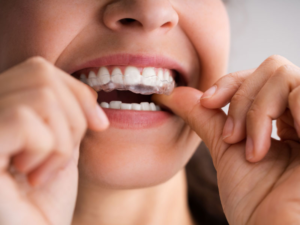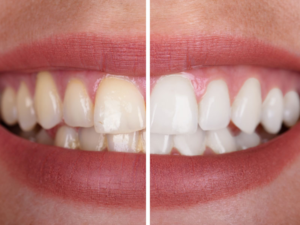
Do you worry excessively about going to the dentist? You’re far from alone. Dental anxiety is a widespread problem affecting millions of Americans. But what if you could simply take a pill to make dental visits a lot easier? Well, you can. It’s called oral sedation, and it can make a huge difference.
Oral sedation dentistry allows you to get the oral health care you need by settling your nerves, and you’ll remain relaxed and comfortable throughout your appointment. Different types of dental sedation are available but oral sedation is the most commonly used. In this post, with the help of Irving dentist Dental Concepts, we’ll be finding out all about dental anxiety and how oral sedation offers an effective, convenient solution.
What is Dental Anxiety?
Many of us experience mild uneasiness about dental appointments. But it’s been estimated that 50 percent to 80 percent of U.S. adults have mild to severe dental anxiety. Because of this apprehension, many don’t see a dentist as often as they should. Others avoid dental care completely.
With modern dentistry, dental anxieties are based on groundless fears. But these concerns are all too real for the individuals who have the problem. Their anxieties are triggered chiefly through fear of pain, although dentistry today is virtually pain free thanks to advances in dental technology, equipment, and techniques.
Feelings of helplessness and loss of control can also contribute to dental anxiety – having to stay still in the dental chair with your mouth wide open, unable to see much of what’s going on. Dental anxiety can also arise through embarrassment and loss of personal space. Many people feel uncomfortable with the physical closeness of the dentist to their face. Others may feel self-conscious about possible bad breath and/or the appearance of their teeth.
What Is Oral Sedation?
With oral sedation, your dentist prescribes sedative medication in the form of a pill, which you take about an hour before your appointment. By the time you arrive at the dental office, you’ll be feeling far more relaxed about any procedure that lies ahead. You’ll remain calm while in the dental chair. You’ll remember little if anything about the experience afterward, thanks to the amnestic effect of the sedative.
Oral sedation works on the central nervous system and reduces activity in areas of the brain that trigger fear and anxiety. As your mood relaxes, negative feelings about your dental procedure will fade away.
Benzodiazepines in Oral Dental Sedation
Dentists typically prescribe oral sedation in the form of benzodiazepines. These mild tranquilizers typically go under the following brand names.
- Xanax (alprazolam).
- Ativan (lorazepam).
- Klonopin (clonazepam).
- Valium (diazepam).
- Halcion (triazolam).
Benefits of Oral Sedation
Oral sedation provides a convenient means of managing mild to moderate apprehension about dental visits. Because you’ll feel more comfortable during your dental procedure, it’s easier to work with your Irving dentist in order to get the best outcome from your treatment. You’ll also feel more relaxed before and after your appointment.
During the procedure, you’re awake but extremely relaxed. You’re aware of your surroundings. You know what’s happening and can respond to your dentist. A further benefit of oral sedation is that it allows your dentist to do their job more efficiently. This means less time in the dental chair, and fewer appointments if you need more comprehensive dental care. Oral sedation also suppresses the gagging reflex that some patients experience during dental work. Oral sedation is less intrusive than IV (intravenous) sedation, which entails putting a drip in your arm or back of your hand.
An oral sedative also produces a deeper level of relaxation than laughing gas (nitrous oxide), which involves wearing a face mask that may feel claustrophobic. Besides inducing a state of calm, oral sedation reduces perception of pain. To further minimize discomfort, your dentist will administer local anesthetic is necessary.
Does Oral Sedation Have any Side Effects?
Oral sedation is a common practice in dentistry, with little risk for healthy individuals. The benzodiazepines used are non-addictive and have minimal unpleasant side effects. Once the sedative kicks in, you may feel drowsy, so you’ll need someone to drive you to and from your dental appointment.
After taking an oral sedative, some individuals report sensations such as:
- A tingling sensation through the body.
- Heaviness in the limbs.
- A delay in reflexive responses.
- Nausea.
- Headache.
- Dry mouth.
- Dizziness.
However, these side effects are rare. Recovery from oral sedation is typically fast, although it’s advisable to avoid exercise and work for the rest of the day.
Is Oral Sedation Dentistry Right for You?
Dental oral sedation helps nervous patients get through any dental procedure, from routine preventive measures like professional teeth cleaning to restorative treatments such as dental implants.
An oral sedative can help you overcome a variety of challenges associated with dental anxiety. Oral sedation dentistry could be right for you if:
- You’ve had a bad dental experience in the past.
- You’re nervous because you haven’t seen a dentist in a long time.
- You want to minimize discomfort if a local anesthetic injection is necessary.
- You’re resistant to local anesthesia.
- You get tense in the dental chair.
- You need to stay in the dental chair for some time because of the complexity of the procedure.
- You struggle during dental work because you have a small mouth.
- The noise and sensation of the dental drill upsets you.
- You need a prolonged course of treatment.
- You have a general anxiety disorder.
- You have a phobia linked to dental procedures.
Oral Sedation at Your Irving Dentist
Irving dentist Dental Concepts offers oral sedation as part of its mission to ensure the highest standards of oral health care with a focus on patient comfort and wellbeing. We understand that many individuals struggle with dental anxiety, and we’re always ready to listen to their concerns so we can make it easier for them to get crucial dental care.
Before prescribing an oral sedative, we’ll review your health and medical history to make sure the sedative medication is safe for you to take. Nearly all our patients report a better experience at our dental office after taking an oral sedative. Contact us if you’d like to know more about how dental oral sedation can make all the difference for you.







